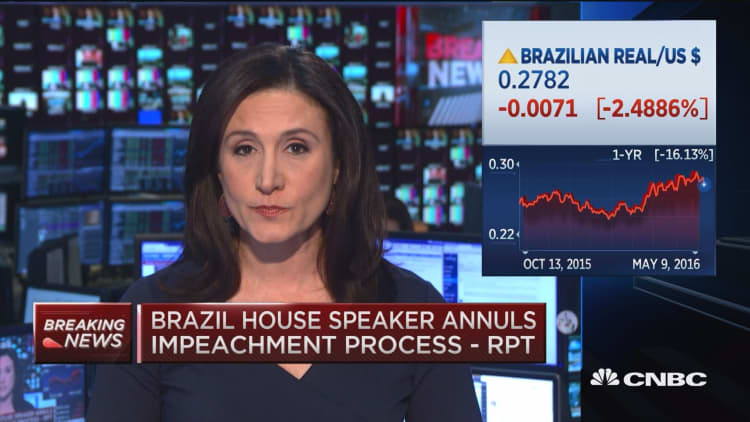
Serious change is in the air in Brazil, and the political drama apparently isn't settled just yet.
Brazil's is one of the best-performing global markets in 2016 — it was up 18 percent coming into the week — as market participants bet on the ouster of Dilma Rousseff, the country's hugely unpopular president. The index dropped sharply Monday, however, after reports cast doubt on whether Rousseff's impeachment is a done deal. The Brazilian real also dropped 4 percent against the dollar.
The acting leader of Brazil's lower house annulled an earlier vote on the president's impeachment, citing procedural flaws, according to a Monday report from Reuters. That vote took place April 17.
The news throws expectations for the week into disarray. On Wednesday, Brazil's Senate is scheduled to vote on whether to proceed with Rousseff's impeachment; a simple majority vote yes was to mean that Rousseff would immediately step down and a trial would kick off shortly.
Impeachment may be irreversible at this point, however, even after the reversal in the lower house. Edwin Gutierrez, head of emerging market sovereign debt at Aberdeen Asset Management, said his firm is "unfazed" by Monday's news, which he called a "mere stall tactic" that could be reversed by Brazil's Supreme Court.
"Even if somehow they manage to re-vote in the house, they can stage that vote as many times as they want and the result will be the same every time," he said. "It's not like impeachment passed by one vote."
A total of 367 lower-house lawmakers voted for impeachment last month, versus 137 against, surpassing the two-thirds majority required .
Eurasia Group said in a note early Monday afternoon that the annulment of the vote is "unlikely to hold."
Markets have hoped to see the vice president and leader of Brazil's largest party (PMDB), Michel Temer, assume presidential duties.
Investors have devoted their attention to Temer and the menu of reforms he plans to implement. Political strategists say Temer's goal is to do as much as he can during any Rousseff suspension to strengthen his credibility and have an impact, given that he likely won't run in the formal 2017 election.
Teneo Intelligence as recently as last week was predicting that Henrique Meirelles, a former central bank president, would become Temer's finance minister.
Brazil is battling an ugly recession, high inflation and a burdening account deficit. In addition to that, Fitch downgraded Brazil's sovereign debt into junk territory, citing "a high level of political uncertainty."
For months the impeachment of Rousseff seemed like an incomprehensible idea given her prowess and wide influence. However, mounting evidence of Rousseff's involvement with the mishandling the country's budget resulted in many of her supporters switching sides.
Correction: This story was revised to correct the spelling of Henrique Meirelles' first name and that he is a former president of the central bank.




